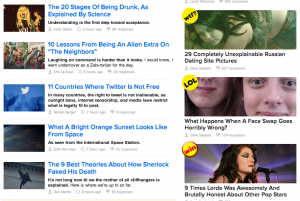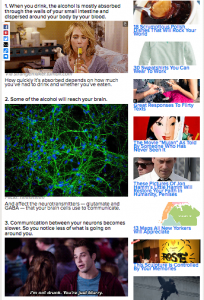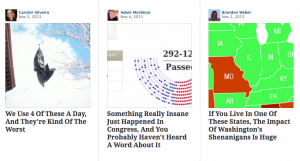When’s the last time you were surfing the web and came across a link that BEGGED you to click it? A headline that was clearly The Most Important Thing you could possibly be reading at that given moment? A headline so eye-catching, so unbelievable, that you felt more compelled to share it with someone else rather than look further into the issue it was highlighting?
Welcome to the post-apocalyptic world of clickbait.
Clickbait will be defined from here on out as the deliberate manipulation of information designed to increase page-view counts. Now wait, you may be asking yourself, isn’t that essentially the definition of advertising?
Yes, yes it is.
An advertisement is ploy used by a company in order to get you, the consumer, to purchase their good or service. Simple concept that we’re all scarily familiar with. An advertisement at its heart is a self-serving mechanism: the business needs customers, so it has to turn you into a customer for their business-end purposes. They’ll dress up their product, make their food seem incredible, make their movie seem like the biggest event of the season, make you feel bad for not having whatever it is they are advertising.
They’re tricking you into feeding them. They’re betting they can purposely manipulate circumstances and predict your exact behavior in response to their efforts. And a huge amount of the time, they’re right. They can perfectly predict how you as a human being will respond to certain stimuli. And they profit off of that knowledge, even though in many cases what you end up consuming doesn’t equate to what you thought you’d consume. Your life isn’t permanently better.
But theirs is.
Business have become so good at advertising and psychological prediction that they don’t even need to make good products anymore. As long as they can convince you that their product is good, through a series of very well-researched smoke and mirrors, their business-end concerns are fulfilled. They still make money, but without the hassle of putting effort into creating something great.
Creating great things is super hard. Few companies ever truly strike it rich with a product that everyone can unanimously praise. But marketing? Marketing is easy. Marketing is a science. There are certain rules business can reliably play by to get the results they want. Money is safe.
Okay, fine. Companies are ruthless in advertising. Tell me something I don’t know. The problem I want to highlight here is the effect on the current cultural conversation when that marketing-oriented set of operating principles is applied to a news organization on the internet. What you get are websites like Buzzfeed and Upworthy.
What you get is clickbait.
Offender #1: Buzzfeed
These are being passed off – on a massive, global scale – as articles. They do a great job of immediately establishing a gut curiosity about the contents of the article: 20 stages of being drunk? There’s 20? I’ve been drunk, I wonder how this article applies to my experience!
Buzzfeed is a master of the dreaded list article (or “listicle”, if you’re an out-of-touch technology columnist from a dying media source). The list article provides several key bits of info designed to get people to click onto them: they imply a breadth of content (29 pictures of people on Russian dating sites is a lot of pictures), they are incredibly easy to digest, because there’s no structural maze on behalf of the writer, and they tend to be about immediately-identifiable concepts. In other words, most of Buzzfeed’s articles are about things you already know. Buzzfeed is predicting that when you read and identify with content already present in your life, that positive reinforcement (which often takes the form of nostalgia fetishization) will prompt you to share it with other people who will also identify with the material.
So what’s happening, basically, is a massive, content-empty marketing effort that masquerades as a news website profiting off of essentially nothing. No journalistic effort goes into any of these Buzzfeed articles because, nine times out of ten, there isn’t even text in the articles. They’re just pictures with captions.
Pictures with captions that describe information you already know about. There’s no actual written content – thus no analysis, or reflection, or in-house research, or point of view, or personal voice, or ANY of the stuff that makes writing enjoyable as well as informative. And what’s scary is that Buzzfeed dominates over traditional, article-based websites that employ the model of a traditional magazine or newspaper. Buzzfeed is a company that publishes nothing but list-based ads for things it knows its readerbase will respond to. No risk, all profit.
Offender #2: Upworthy
Upworthy, like Buzzfeed, is a site that traffics primarily in clickbait, but unlike Buzzfeed, Upworthy doesn’t use the tried-and-true list format. Rather, Upworthy’s “articles” consist of a single video or a photo series that make one single point or highlight one specific idea, and they are generally geared towards being reaffirming, inspirational, or “eye-opening” content. So while Upworthy’s content contains less “information” than Buzzfeed articles, they cater to the same core market: people who will relate to their content and share it. Upworthy’s own mission statement is “Things that matter. Pass ’em on.”
This company’s modus operandi is literally “share this with other people.” The whole basis of the website isn’t built on providing worthwhile content to subscribers, but rather to get shares on the internet. How do they package the inspiring content they cultivate on the internet without the list-format?
By making every story they publish seem like the most important possible thing you could be reading at that given moment, but without providing any specifics. Upworthy’s gambit is that the insane amount of built-in hype in the headline will make readers eager to learn what the specifics of the content are. Here’s some examples:
Can somebody please explain how this isn’t illegal? Right away, Upworthy has done three things that trigger the reader’s immediate interest: they sensationalize, they slant, and they avoid specifics. Whatever this legal thing is (lack of specificity), it appears to be a huge deal because this person is begging for an explanation (sensational), and the headline includes a built-in slant against the information that’s going to presented in the link because the editorial voice of the headline is already opposed to whatever it is that is still legal.
This isn’t journalism. It’s brilliant, empty marketing, and if you browse Buzzfeed or share Upworthy links, you’re playing right into their hands.
Discover more from UCWbLing
Subscribe to get the latest posts sent to your email.





